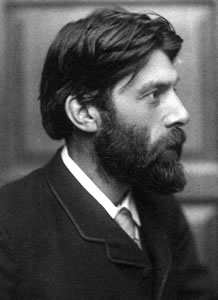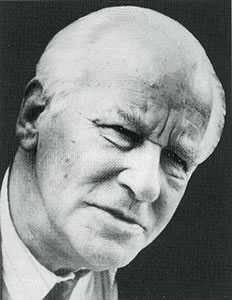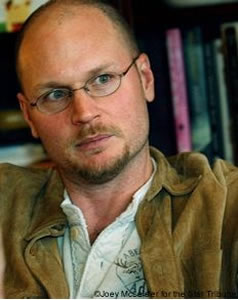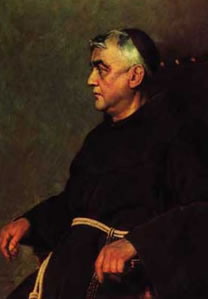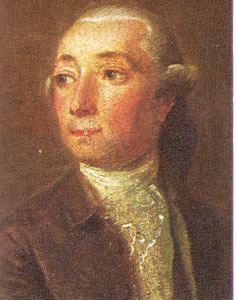De Nederlandse dichter en schrijver Michel van der Plas werd geboren op 23 oktober 1927 in Den Haag. Zie ook mijn blog van 23 oktober 2006 en ook mijn blog van 23 oktober 2007 en ook mijn blog van 23 oktober 2008 en ook mijn blog van 23 oktober 2009.
Uit Warschau
Het kerkhof van een getto. Stenen. Stenen.
Gezichten die niet zeggen wat ze menen.
Hangende handen. Lusteloze voeten.
Ze waden door een eeuwig puin. Ze moeten.
Maar op een zolderkamer gaan ze leven.
Vertellen. Menselijk bewegen. Even.
Ze worden vogels, fladderen en wiegen.
Tot aan ’t plafond. Dan weifelen ze. Liegen.
Schrompelen samen, vallen en verkillen.
Lichamen die niet leven wat ze willen.
Regentesselaan
Wat heeft ons op die morgen toch wel mogen
doen lopen langs de Regentesselaan,
waar ons de blaren om de oren vlogen?
Waar kwamen we in ’s hemelsnaam vandaan?
Hoe dan ook, er kwam een mannetje aan
waardoor je blik opeens werd aangezogen,
een en al zwarte hoed en zwarte ogen,
voorzichtig schuifelend, – en jij bleef staan.
Kloos, zei je, toen hij bij het hoekje kwam –
een hoopje mens, maar toch een zo geachte,
dat je, eerbiedig, op een afstand, wachtte,
en, ongezien door hem, je hoed afnam.
Daar ging een god in ’t diepst van zijn gedachten
naar P. van Haasdrecht voor een half ons ham.

Michel van der Plas (Den Haag, 23 oktober 1927)
De Albanees-Amerikaanse schrijfster en actrice Masiela Lusha werd geboren op 23 oktober 1985 in Tirana. Zie ook mijn blog van 23 oktober 2008 en ook mijn blog van 23 oktober 2009.
Vienna
Vienna’s yellow palace rests above a cloud
Of chilled Hungarian lights,
But the gardens are still red and violet
And the three rocks still carry my wishes
From springtides before.
The snow still shines like a field
Of angel satin dressing history.
The garden maze of frosted Sylvester
Chills my worries solid
So that I may break myself
Apart and away and twirl
Like easy snow, my joy,
Clear above the rounded hills.
This Vienna! My love letter
To her time will ride the
Syllables of drawn memories
Into fields and museums,
Cathedrals and music and smiles,
Swans dressed as ballerinas.
My Vienna, my youth
Of clouded breaths, and mittens
And Weinnachtsmann the jolly German giant
Offering chocolate upon chocolate on Christmas Eve.
The mornings after, my golden schnitzels
And toasted chestnuts and steaming punch and walks
Through Stephansplatz.
Her Sunday bells call forth an art
Of celebrated Strauss and violins
And tall maestros
(Lean measures of physical music)
All giants, all play in my heart.
I cradle the dream in my ear.
This beauty I posses with time
Calls through me like a river
Glabrous in all its long glory,
Raising swans and lilies over the shore
And I let the river—a network
Of Europe
Work and flow through the values
Of my memory and pride
And with one frothy sigh,
I let the blue Danube
Finally escape my eyes.

Masiela Lusha (Tirana, 23 oktober 1985)
De Amerikaanse schrijver Augusten Xon Burroughs werd geboren op 23 oktober 1965 in Pittsburgh, Pennsylvania. Zie ook mijn blog van 23 oktober 2008 en ook mijn blog van 23 oktober 2009.
Uit: A Wolf at the Table. A Memoir of My Father
“Sitting in my high chair, I held a saltine cracker up to my eye and peered through one of the tiny holes, astonished that I could see so much through such a small opening. Everything on the other side of the kitchen seemed nearer when viewed through this little window.
The cracker was huge, larger than my hand. And through this pinprick hole I could see the world.
I brought the cracker to my lips, nibbled off the corners, and mashed the rest into a dry, salty dust. I clapped, enchanted.
The hem of my mother’s skirt. A wicker lantern that hangs from the ceiling, painting the walls with sliding, breathing shadows. A wooden spoon and the hollow knock as it strikes the interior of a simmering pot. My high chair’s cool metal tray and the backs of my legs stuck to the seat. My mother twisting the telephone cord around her fingers, my mouth on the cord, the deeply satisfying sensation of biting the tight, springy loops.
I was one and a half years old.
These fragments are all that remain of my early childhood. There are no words, just sounds: my mother’s breathy humming in my ear, her voice the most familiar thing to me, more known than my own hand. My hand still surprises me at all times; the lines and creases, the way the webbing between my fingers glows red if I hold up my hand to block the sun. My mother’s voice is my home and when I am surrounded by her sounds, I sleep.
The thickly slippery feel of my bottle’s rubber nipple inside my mouth. The shocking, sudden emptiness that fills me when it’s pulled away.
My first whole memory is this: I am on the floor. I am in a room. High above me is my crib, my homebox, my goodcage, but it’s up, up, up. High in the air, resting upon stilts. There is a door with a knob like a faceted glass jewel. I have never touched it but I reach for it every time I am lifted.
Above my head is a fist of brightness that stings my eyes. The brightness hangs from a black line.“

Augusten Burroughs (Pittsburgh, 23 oktober 1965)
De Amerikaanse dichter, schrijver en journalist Nick Tosches werd geboren in 1949 in Newark, New Jersey. Zie ook mijn blog van 23 oktober 2008 en ook mijn blog van 23 oktober 2009.
Uit: The Nick Tosches Reader
„I was eighteen or nineteen years old, working days at the Lovable Underwear Company, when I came to know the poet Ed Sanders. Ed, who twenty years later would win an American Book Award for his poetry, was then the ringleader of the notorious band The Fugs, and he also ran the Peace Eye bookstore, which at that time was on Avenue A.
Ed had a degree in classical languages, and could read fluently in their own Greek and Latin those ancient poets that I could only understand through the gauze of translation. I had tried to teach myself Greek from the two volumes of A Reading Course in Homeric Greek that I had robbed from a divinity student a few years before, and I had taken Latin in high school; but it was beyond me to truly delve the beauties and powers of the poetry of those tongues, as Ed could. He had even studied Egyptian hieroglyphics.
We shared, he in his erudite way and I in my unlettered fashion, a love for those ancient fragments that were the wisps of the source, the wisps of origin, the wisps of the first and truest expression of all that since had been said. And we both had dirty minds, given as much to the gutter as to the gods.
The Lower East Side was a different place back then. It was still a neighborhood. East Thirteenth Street was still known as the Street of Silence, a name I would bestow on another Mafia stronghold, Sullivan Street, in my novel Cut Numbers. The joints were still joints. We drank a lot in those joints.
Ed was a great guy. He was about ten years older than I, and was the first real poet to whom I showed my poetry. “Hell, man,” he told me, “you’re a fucking poet.” As I doubt he ever realized he was my first mentor, so I doubt he ever realized what a shove forward, what a turning point, this was for me.
That poem, which bore the title “Still/Life,” and which I later invoked in my novel Trinities, is long gone. Fragments of it follow.“

Nick Tosches (Newark, 23 oktober 1949)
De Duitse dichter, schrijver en uitgever Rodja Weigand werd geboren op 23 oktober 1945 in München. Hij werd opgeleid tot betonbouwer en schrijft sinds 1963 poëzie en proza. Hij is ook de uitgever van het Landsberger Lesebuch en van dichtbundels van Paul Eluard, Jannis Ritsos, Franziska Sellwig, Elfriede Jelinek, Giorgos Seferis, Keorapetse Kgositsile, Rubén Darío, Nelly Sachs, Walt Whitman, Ernest Hemingway en Rafael Alberti. Rodja Weigand woont in Schwifting.
Schockgefroren
trakl öffnet den raum
glas zerbricht zwischen
den schenkeln der schwester
der voyeur unter der treppe
mit brennenden augen
die herberge
eine wohnstatt
aus klebrigem sekret
und dann
kam frost

Rodja Weigand (München, 23 oktober 1945)
München (Geen portret beschikbaar)
De Engelse dichter, toneel- en prozaschrijver Robert Seymour Bridges werd geboren in Walmer, Kent, op 23 oktober 1844. Zie ook mijn blog van 23 oktober 2009.
My Delight and Thy Delight
My delight and thy delight
Walking, like two angels white,
In the gardens of the night:
My desire and thy desire
Twining to a tongue of fire,
Leaping live, and laughing higher:
Thro’ the everlasting strife
In the mystery of life.
Love, from whom the world begun,
Hath the secret of the sun.
Love can tell, and love alone,
Whence the million stars were strewn,
Why each atom knows its own,
How, in spite of woe and death,
Gay is life, and sweet is breath:
This he taught us, this we knew,
Happy in his science true,
Hand in hand as we stood
‘Neath the shadows of the wood,
Heart to heart as we lay
In the dawning of the day.
North Wind in October
In the golden glade the chestnuts are fallen all;
From the sered boughs of the oak the acorns fall:
The beech scatters her ruddy fire;
The lime hath stripped to the cold,
And standeth naked above her yellow attire:
The larch thinneth her spire
To lay the ways of the wood with cloth of gold.
Out of the golden-green and white Of the brake the fir-trees stand upright
In the forest of flame, and wave aloft
To the blue of heaven their blue-green tuftings soft.
But swiftly in shuddering gloom the splendours fail,
As the harrying North-wind beareth
A cloud of skirmishing hail
The grieved woodland to smite:
In a hurricane through the trees he teareth,
Raking the boughs and the leaves rending,
And whistleth to the descending
Blows of his icy flail.
Gold and snow he mixeth in spite,
And whirleth afar; as away on his winnowing flight
He passeth, and all again for ahile is bright.

Robert Bridges (23 oktober 1844 – 21 april 1930)
De Oostenrijkse schrijver Adalbert Stifter werd geboren in Oberplan op 23 oktober 1805. Zie ook mijn blog van 23 oktober 2006 en ook mijn blog van 23 oktober 2007 en ook mijn blog van 23 oktober 2008 en ook mijn blog van 23 oktober 2009.
Uit: Mein Leben
„Es ist das kleinste Sandkörnchen ein Wunder, das wir nicht ergründen können. Daß es ist, daß seine Teile zusammenhängen, daß sie getrennt werden können, daß sie wieder Körner sind, daß die Teilung fortgesetzt werden kann, und wie weit, wird uns hienieden immer ein Geheimnis bleiben. Nur weniges, was unserem Sinne von ihm kund wird, und weniges, was in seiner Wechselwirkung mit anderen Dingen zu unserer Wahrnehmung gelangt, ist unser Eigentum, das andere ruht in Gott. Die großen Körper, davon es getrennt worden ist und die den Außenbau unserer Erde bilden, sind uns in ihrer Eigenheit unbekannt wie das Sandkörnchen.
Sie sind, und wir sagen manches von ihnen aus, das auf dem Pfade unserer Wahrnehmungskräfte zu uns hereinkömmt.
Und dann sind die Planeten, die wie unsere Erde als andere Erden in dem ungeheuren Raume schweben, der uns zunächst an uns durch sie geoffenbart wird. Dann sind weiter außer ihnen die Fixsterne, die in dem noch viel größeren Raume, den sie darstellen, bestehen, und deren Größe sowie die Größe des Raumes wir durch Zahlen ausdrücken, aber in unserem Vorstellungsvermögen nicht fassen können. Dann geht, wie unsere Fernröhre zeigen, der körpererfüllte Raum fort und fort. Wir nennen das alles die Welt und heißen sie das größte Wunder. Aber auf den Dingen der Welt ist ein noch größeres Wunder, das Leben. Wir stehen vor dem Abgrund dieses Rätsels in Staunen und Ohnmacht. Das Leben berührt uns so innig und hold, daß uns alles, darin wir es zu entdecken vermögen, verwandt, und alles, darin wir es nicht sehen können, fremd ist, daß wir seine Zeichen in Moosen, Kräutern, Bäumen, Tieren liebreich verfolgen, daß wir sie in der Geschichte des menschlichen Geschlechts und in den Darstellungen einzelner Menschen begierig in uns aufnehmen, daß wir Leben in unseren Künsten dichten und daß wir uns selber ohne Leben gar nicht zu denken vermögen.

Adalbert Stifter (23 oktober 1805 – 28 januari 1868)
Standbeeld in Linz
De Albanese dichter, vertaler en pater Franciscaan Gjergj Fishta werd geboren op 23 oktober 1871 in Fishta të Zadrimes. Zie ook mijn blog van 23 oktober 2008.
THE HIGHLAND LUTE (fragment)
Never with the Turks agreeing
Never out of sight their rifles.
They waged war on them, were slaughtered,
Just as if with shkjas in battle.
Therefore, when the Turkish ora
Started to lose power, weaken,
When her drive began to crumble,
Russia day by day beset her
And the tribesmen of the Balkans
Began to flee the sultan’s power,
Did the Albanians start to ponder
How to free their native country
From the Turkish yoke and make it
As when ruled by Castriota,
When Albanians lived in freedom,
Did not bow or show submission,
To a foreign king or sultan,
Did not pay them tithes and taxes.
And Albania’s banner fluttered
Like the wings of all God’s angels,
Like the bolts of lightning flashing,
Waving high upon their homeland.
But the Prince of Montenegro,
Prince Nikolla the foolhardy,
Yes, foolhardy, but a nuisance,
Gathered weapons, gathered soldiers
To attack and take Albania,
To subdue the plains and mountains
Down the length of the Drin river,
Right down to Rozafat’s fortress,
There to plant his trobojnica
Place on Shkodra his kapica
Make it part of Montenegro,
Leave a bloodbath there behind him.
Sat the Turk there in a stupor,
Teardrops from his eyes did tumble,
For the shkjas he could not counter
Now that Moscow had surrounded
Stamboul and besieged the city.

Gjergj Fishta ( 23 oktober 1871 – 30 december 1940)
De Franse schrijver Nicolas Edmonde Restif de La Bretonne werd geboren op 23 oktober 1734 in Sacy bij Auxerre. Zie ook mijn blog van 23 oktober 2008.
Uit: L’anti-Justine
„Et ils le mirent sur la brune Rosemauve, bien écartée, et Conette dirigea le vit. Cette fille ,la plus chaude des garces si Mme Vitnègre ne l’eut pas surpassée, engloutit le vit en trois coups de cul sans intervalle. Cordaboyau déchargea en hurlant de volupté, Rosemauve l’étreignant avec une délicieuse fureur.
Cependant, ce je que voyais m’avait roidi, et j’enfonçait dans le con humide de ma déesse qui, suffisamment limée, déchargea deux foix avant que je l’humectasse de mon foutre paternel. Elle gigotait, criotait, soupirotait. Hâ ! s’écria Traitdamour, vous êtes le dieu de son con, cher Maître ! il se fond en jus d’amour quand vous le perforez ! Voyez comme elle en donne, l’adorable enfant !… Allons, céleste trémousse, trémousse ! Fous, divine garce ! décharge…
Ce fut ensuite le tour de Brisemotte. Conette, pommadée, fut étendue sur le foutoir. Il enconna ma fille. La grosseur du vit et sa roideur lui arrachait de sourds gémissements. Elle travaillait de toutes ses forces, mais le terrible engin avait encore plus de trois pouces pour toucher le fond. Tout à coup, nous nous apercevons que le perfide Brisemotte veut inonder d’un torrent de sperme le conin qu’il martyrise. Nous ne pouvions l’enlever et l’arracher, son vit lapait comme celui d’un gros dogue dans la vulve enflammée d’une grande levrette. En ce péril, nous implorâmes, Traitdamour et moi, la pudeur de Conquette. L’adorable fouteuse, fidèle à nos vits, donna un coup de cul derrière et se déconna. Traitdamour plongea rapidement son braquemart en furie dans le con béant.
Brisemotte, enragé, se jeta sur Rosemauve, qui ne s’y attendait pas, et la foutit en levrette avec tant de brutalité qu’il la fit crier autant de douleur que de plaisir.“

Réstif de la Bretonne (23 oktober 1734 – 3 februari 1806)
















